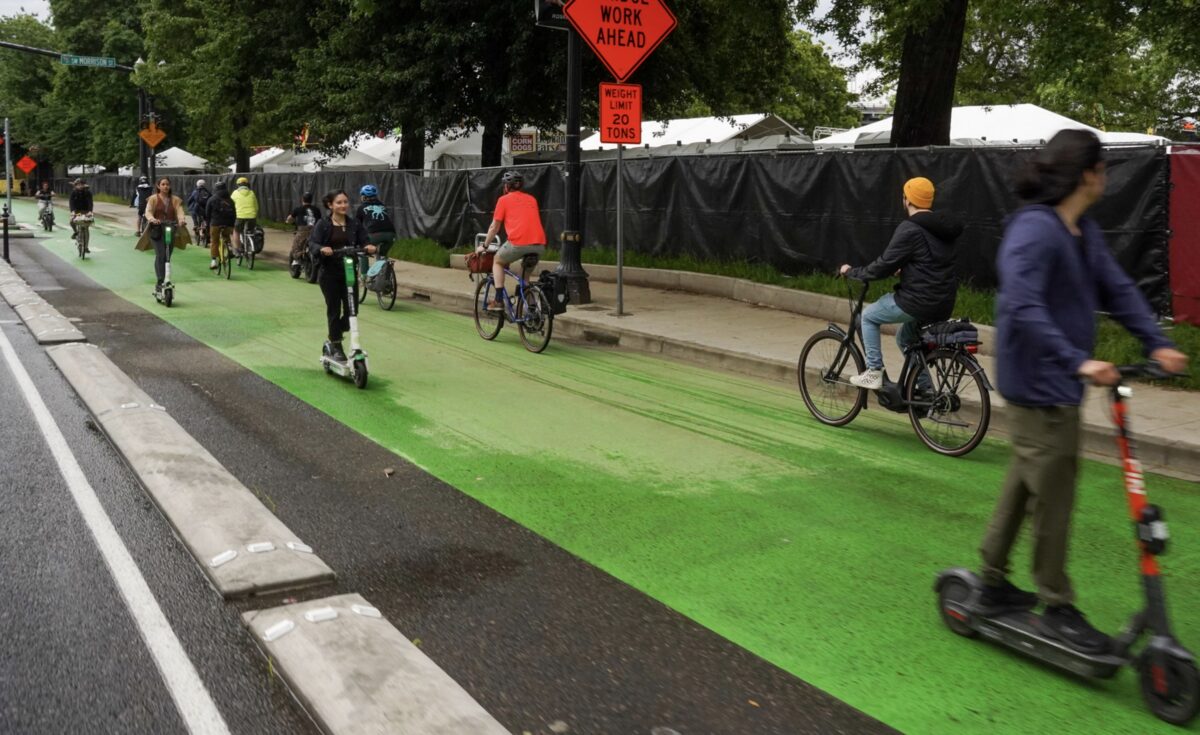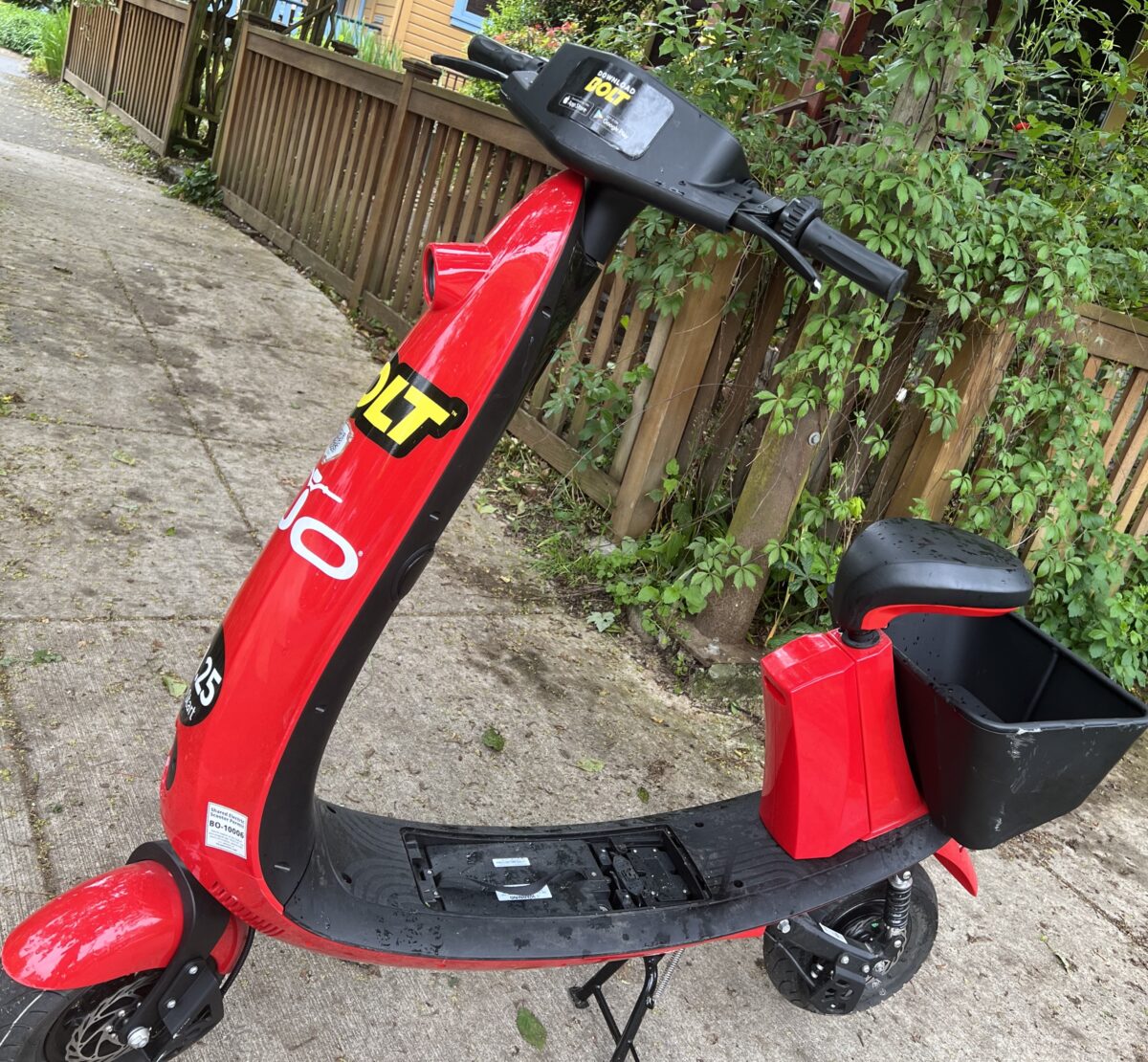
“We believe shared e-scooters have a long-term future in Portland.”
– Dylan Rivera, PBOT
After a four-year honeymoon, the City of Portland is ready to settle down with shared electric scooters.
Earlier this month the Bureau of Transportation released a request for proposals that aims to find a company to run a shared e-scooter system that would remove the current “pilot program” status and run through 2025.
The decision to double-down on scooters comes after PBOT has spent the past four years test-riding them and and analyzing impacts on car trip reduction, safety, and accessibility for people typically underserved by the transportation system. The first pilot launched in July 2018. The program had detractors, but riders voted with their feet and logged over 700,000 rides in just four months. PBOT launched a second pilot in April 2019 and the system has worked well enough for them to keep it running through today.
Scooters have even survived the pandemic. PBOT’s new data portal shows current ridership on a strong upward trajectory compared to last year and the number of rides is only down about 18% from 2019 (pre-pandemic) levels.
Since 2018 PBOT has worked with six different scooter companies and has permitted 2,990 scooters for a system that has logged more than 3.2 million trips.
In PBOT’s eyes, e-scooters have passed all the tests and it’s time to end the courtship and tie the knot.
“We believe shared e-scooters have a long-term future in Portland and this request for proposals is a major, tangible step in that direction,” said PBOT Public Information Officer Dylan Rivera yesterday when we asked him about the significance of the RFP. “E-scooters have shown themselves to be a convenient, useful and environmentally sustainable part of our transportation system.”
PBOT says they’ll award the contract to one or two vendors and the new fleet will grow to 3,500 scooters (up from 3,100 today). The winner of the contract(s) must demonstrate how they’ll achieve the city’s three goals of: reducing vehicle miles traveled and combating climate change, promoting safety and responsible riding, and reducing impacts of racial disparities that exist in our transportation system.
One of the biggest complaints about scooters is how they clutter sidewalks and block right-of-way. The RFP reveals that PBOT wants to take a big step to tackle that problem by requiring vendors to provide a “lock-to mechanism” for every e-scooter in the fleet and require riders to use it. Lyft, the company that runs Portland’s Biketown bike share system, recently launched their first docked scooter stations in Chicago.
PBOT says they won’t require specialized docks for the scooters. Bike racks and other types of “approved infrastructure” can be considered a “lock-to mechanism.”
Following a successful expansion of the current service area well beyond the central city and into east and northeast Portland, the new system will expand its geographic footprint. PBOT says they’ll require operators to maintain a minimum service level in neighborhoods citywide.
Ease of access is also something PBOT hopes to improve with the new contract.
With four scooter companies operating in Portland today, users have to have a different app to rent from each one. When the new operators are chosen this fall, users will need only one or two.
Speaking of apps, PBOT is working on a new one that will include scooter rentals and take its successful Transportation Wallet program to the next level. They’re working with software company RideShark to develop, “an integrated platform to distribute multi-modal transportation incentives to qualified Portlanders in 2023.”
E-scooters are currently one of the most expensive forms of transportation in Portland with an average trip costing about $5.55. That’s more than twice the cost of a transit trip, more than three times the cost of a typical Biketown trip, and even more expensive than driving a car! In their RFP, PBOT says they want scooter rentals to cost no more than $1 to unlock and no more than $0.35 per minute. Would-be scooter vendors will also need to provide cash payment options and participate in discount programs for lower-income riders.
Accessibility might also improve due to a stipulation in the RFP that requires companies to create a customer service portal and complaint process that is integrated with the City’s 311 system, “that are continually accessible to riders and community members with various types of disabilities.”
Rivera says moving into a more serious relationship with e-scooters will improve the system for everyone. Fewer companies will lead to more market share and financial stability for the operators, and removing the “pilot” status will give PBOT a stronger regulatory stance to create a system more closely aligned with their vision.
The next chapter of e-scooters in Portland will, “change the city’s relationship from a regulator to a partner,” Rivera said. “It will be more like the Biketown relationship and less like the city’s relationship with taxis and transportation network companies (Uber and Lyft, etc).”
For example, the new contract will require companies to use salaried employees that receive benefits, instead of contractors.
If all goes according to plan, Portland’s new scooter service would start later this year or early 2023 and run through fall 2025. Current scooter vendors will be allowed to operate until the future system is launched so there will be no gap in service.



